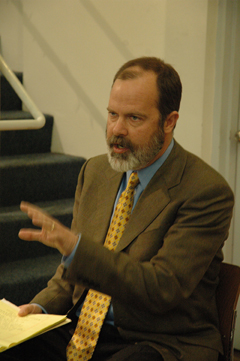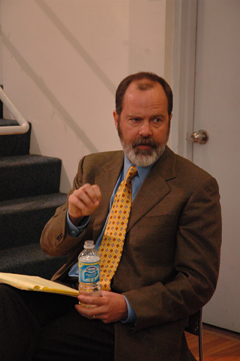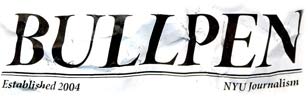Lecture: Jim Newton

Jim Newton. Photo: Laurel Angrist. © 2007 Laurel Angrist.
When Jim Newton started reporting in 1987, he didn't think twice about granting sources anonymity.
Now, however, the Los Angeles Times city and county bureau chief is convinced that some of his hundreds of anonymous sources could have gone on the record. “If I had it to do over again, there are some people I could have gotten on the record, and I didn’t try hard enough,” he told an audience of 20 students in the fifth-floor atrium of NYU’s Department of Journalism on February 13, 2007. “I relied on anonymous sourcing more than I would allow people in my bureau to do today.”
Newton acknowledged, at least tacitly, that public trust in faceless insiders has faltered since the days when he covered Atlanta’s City Hall and, later, the Los Angeles Police Department and the Rodney King beating. Watergate and the Pentagon Papers impressed on reporters and readers alike the importance of whistleblowers. But in light of recent clashes between the press and the federal government over issues such as the New York Times’ reports on illegal wiretapping and reporter Robert Novak’s outing of a covert CIA operative, journalists and inside sources are increasingly wary of subpoenas and the public is growing skeptical of informed sources whose leaks sometimes turn out to be nothing more than spin control.
“I relied on anonymous sourcing more than I would allow people in my bureau to do today.”
“It seemed awfully glamorous to meet in darkened parking garages and to leave their carnations on the doorstep or whatever else they did,” Newton said, referring to Watergate. But now reporters face a tight-lipped White House and a “belligerent court,” he said. Reporters are in greater danger of going to jail than ever before, “at least in my professional life,” Newton said.
He cautioned his audience, most of which was enrolled in NYU’s graduate journalism program, to “take great care” before agreeing to quote a source anonymously. He warned reporters to be especially cautious about granting anonymity to sources who seem too eager to use the newsmedia as a public-address system to promote their agenda. As well, he stressed the importance of a precise agreement on how the reporter would identify the unnamed source in his or her story.
Once a reporter grants anonymity, said Newton, that agreement is a sacred trust. “Grant it and you never break it,” he said, adding that a journalist who betrays a source’s confidence is making “a career-ending mistake.”
Newton contrasted the current atmosphere with prevailing attitudes at the start of his 18-year career at The Los Angeles Times. Back when he was a beat reporter, covering the LAPD, Newton said, the government seldom questioned journalists about their secret sources. Moreover, courts weren’t as determined to ferret out journalists’ sources as they are today.

Jim Newton. Photo: Laurel Angrist. © 2007 Laurel Angrist.
During his career, said Newton, he had received a couple of requests that he turn over his notes, but his editors always came to his aid: they “said no, and it went away.” But, he cautioned his student listeners, such conflicts are not as easily resolved now. Early this year, the U.S. Department of Agriculture tried to demand a Los Angeles Times reporter’s notes. “The threat now is real,” said Newton. “They won't go away.”
Newton sees, in the Internet, a possible means of banishing this threat. During the question-and-answer session that followed his lecture, he proposed that reporters whose reporting relies on sensitive documents — the sort of information that can trigger legal action — make the documents related to potentially controversial stories publicly available, on the Web. The best thing to do with sensitive information is to “give it over before anyone asks,” Newton said.

